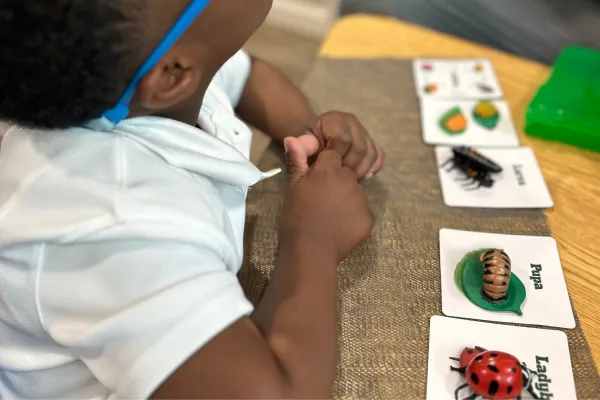
The Wonders of Science for Young Children
Science captivates young minds, opening doors to exploration and discovery. Through hands-on experiences, children develop a love for learning and curiosity about the world around them. In Montessori education, science is more than just facts—it's about fostering wonder. Let's dive into some amazing examples of science learning for young children!
Cover Photo: Learning About the Life Cycle of a Ladybug
In the cover photo, we see a child at a table, carefully studying the life cycle of a ladybug. Introducing children to the concept of life cycles allows them to explore the beauty of growth and transformation. By understanding that living things go through distinct stages, children develop a deeper appreciation for the world of nature. The hands-on approach of using models or visual aids helps solidify this concept in a way that is both fun and educational.
Exploring the School Garden
The next set of photos features a child working in the school's backyard garden. Gardens are natural laboratories where children learn about ecosystems, plant life, and the importance of nurturing living things. Whether it’s planting seeds or observing the different stages of plant growth, gardening fosters responsibility and patience. This hands-on connection to the environment helps children understand the cycle of growth and the role we play in sustaining it.

Hands-on Science Experiments
The second image brings together three diverse science activities. On the left, a bowl of gluten-free dough invites children to engage in tactile learning, exploring textures and cause and effect. In the middle, a classic science experiment takes place with baking soda, vinegar, and a latex glove. Watching the glove inflate due to the reaction of the two ingredients is a thrilling introduction to chemistry and physical reactions. Finally, on the right, the magnifying glass and acrylic bugs encourage children to closely observe and learn about insects, enhancing their observational skills and sparking curiosity about different species.

Gardening—From Watering to Harvesting
The next photos feature more garden-based activities. On the left, a child is watering plants, learning the importance of nurturing living things. On the right, the harvest is in full swing as a child digs up potatoes. This hands-on experience helps children see the full cycle of growth—from planting seeds to reaping the rewards of their care and effort. It instills a sense of responsibility, teaches them where food comes from, and provides real-world connections to science.

Why Early Science Matters
Science is all about curiosity and discovery, and young children are naturally inclined to explore. Through these activities, children learn to question, observe, and draw conclusions—skills that are essential for future learning. By engaging in life cycles, gardening, and experiments, children gain a deeper understanding of the world around them and build the foundation for scientific thinking. Think about ways you can include science based activities with your little Sunshines!

